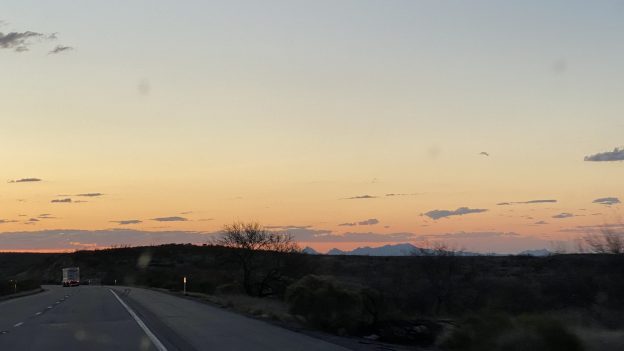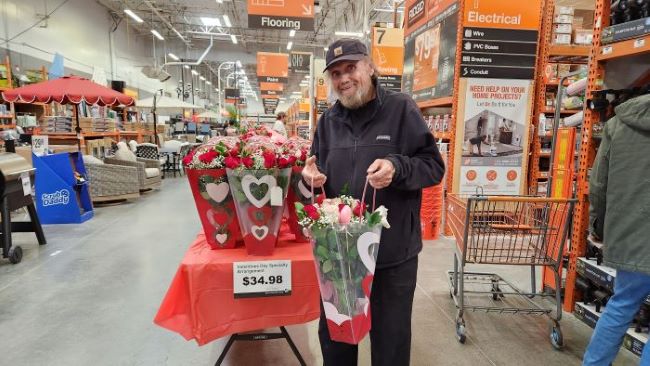Featured Posts

My wife Carmela has never really understood me. Like most females, she remains very practical about the literal meaning of many things.
For instance, if I say, “You know honey, I would really like to move to Alaska and build a log cabin.”
Then she would say: “Where exactly are you going to get the logs, how are you going to buy the pipes and install the plumbing, where is the running water going to come from, what about the disposal of sewage, and where is the nearest grocery store going to be?”
Now that I have been challenged, I end up making some crazy off-the-top-of-my-head comments about buying an axe, cutting down trees, building a log cabin, diverting a nearby stream for water, and somehow digging a hole in the frozen tundra to install a septic tank. As far as nearby grocery stores, I would go out and catch some fish in the stream, snare some rabbits and birds in traps, and once in a while shoot a moose. She could gather wild berries in the summer to can for later and collect eggs from the chickens we would take with us.
Of course, the more I talk, the more ridiculous it sounds, and she would just shake her head like I’m an idiot, and declare she was not moving to the middle of nowhere and living on berries and moose meat. End of subject.
My mistake, of course, is trying to defend what I am saying. But recently, I have learned a new word that describes exactly what I am doing.
It comes from a Scottish duo named the “Proclaimers” in a song titled: “I would walk 5oo miles.” The song describes a man who is totally devoted to a woman and vows in the chorus:
“I would walk 500 miles
And I would walk 500 more
Just to be the man who walked a thousand
Miles to fall down at your door.”
I like the song, mainly because much like the lyrics, I am also devoted to a woman – although sometimes she clearly does not understand me.
The magic word, I’ve finally found, comes in one of the verses of the song, in which the singers proclaim.
If I get drunk, well I know I’m going to be
I’m going to be the man who gets drunk next to you
And if I haver, yeah, I know I’m going to be
I’m going to be the man who’s havering to you.
So, we’re listening to the song, and Carmela asks, what is “havering?”
I have no idea, so I look it up on the internet. It turns out that “havering” is a Scottish term for talking nonsense.
And just like that I have found the perfect word to explain the kind of things I often say to my wife that make her think I’m not quite all there.
A few days later, we’re driving through the desert in New Mexico, just after sunset, and the whole twilight world turns soft and fuzzy in the afterglow of the day. The time between sunset and darkness has been a bit magical for me ever since I was a child, chasing fireflies before being ordered to bed.
So, I say to my wife, “You know, I would like to pull over, grab a light blanket from the back of the truck, walk a couple of miles into the desert and lay down in the soft sand and spend the night.”
And right away, she starts talking about rocks and thorns, spiders and snakes, and other little nasty creatures that will crawl into our ears and fly up our noses.
“Honey,” I tell her, “I know all that, I’m just ‘havering’ because it looks so magical driving through the desert at this time of evening.”
I wasn’t trying to be practical. I was expressing how the beauty of what we were seeing made me feel.
And best of all, I think she finally got it too.
If you would like to subscribe to our work, you may contact me at george@georgeleecunningham.com and let me know and you will get an email reminder of blog postings. Your name will not be shared and you may cancel at any time.

Around midnight on February 2, two B1-B Lancer stealth bombers used 125 precision-guided missiles to strike 85 targets in Iraq and Syria. The bombers had flown all the way from Dyess Air Force Base in Texas, then returned home in what was a 44-hour mission. The targets included command and intelligence centers, rockets, and drone storage and supply chain facilities.
The politics aside, it had special meaning for my wife Carmela Cunningham.
Back in the early 1980s – when a mid-2os Carmela was still Carmela Castorina – she worked in public relations for the B1-B program at Rockwell International.
She interviewed the people who built the plane from the folks who carefully laid out the complex electrical connections that controlled the aircraft and its moveable swept-back wings, to the engineers who helped design everything from the landing gear to the avionics, and to the company executives that oversaw the program.
And she often had to babysit sometimes-hostile members of the press.
She had the privilege to climb aboard the aircraft while it was being built and after it was completed. She helped host celebrations in Palmdale with test pilots, Air Force brass and aviation legends such as retired Gen. Jimmy Doolittle, who led the B-25 raid over Tokyo in 1942. One of her work friends was test pilot Doug Benefield, who died shortly thereafter when he crashed in the Mojave Desert during tests of the B-1B’s low-altitude, radar-avoiding avionics.
It wasn’t all test pilots and chasing down the runway during takeoffs and landings. There was also the politics – the retired generals who used their influence to land cushy executive positions with the company; the congressmen who toured the plant, gave a talk after lunch and received an “honorarium” for their efforts; and the grown children of politicians and military brass who spent their summers in well-paid and cushy jobs at the company.
And though she grew weary of the politics and the never-ending corporate meetings on how to improve employee morale and how to boost the company’s image, she remained proud of the aircraft and of the hard-working people who had poured their talents into developing technology and making it all come together.
So, when she read about the mission and how successful the plane fulfilled the purpose for which it was built, she couldn’t help but feel at little proud of the small part she had played. She was also sad and a bit horrified about the people who had been killed and injured in the bombing.
The numbers of casualties depend on which side is doing the counting, but there were scores of fatalities and a larger number of wounded. And there is much controversy over the politics of the mission and the political fallout, but that will be an argument for those so inclined.
Carmela remains proud of the aircraft she wrote about and promoted and the smart and hard-working people she met during her time at Rockwell. And the blood on her hands? That’s something she also has to acknowledge.
It may not make her happy, but she knew 40 years ago what the plane was designed to do, and what it finally did. And she’s willing to live with that.
If you would like to subscribe to our work, you may contact me at george@georgeleecunningham.com and let me know and you will get an email reminder of blog postings. Your name will not be shared and you may cancel at any time.

Women, please don’t read this. It’s just going to make you mad, and believe me, none of us on the male side of the wonderful dance of love want that. Especially not in February – the month of love.
Okay men, now that we’re alone, I have some advice for you about the upcoming holiday. And if you’re thinking to yourself, “what holiday,” you REALLY need this advice. February 14 is St. Valentines Day. And while that might be a big snoozer to you – it’s not to the lovely creature with whom you share a life. To her, it’s a big deal, and you are expected to get a lovely, meaningful present for her – and to act like you are so very happy to have the pleasure. If you do not get her something appropriate, something that says you are honored to be buying her this lovely gift, there is going to be Hell to pay. As I get ready to celebrate my 80-something Valentine’s Day, I’m going to share a few do’s and don’ts with you. My own little gift toward ensuring world peace.
FIRST: Don’t forget. That is the worst thing you can do. And, don’t let her trick you into anything. Valentine’s Day is a test, and you don’t want to flunk it.
If the lovely lady in your life wakes up one morning and says, “oh Honey, don’t buy me anything for Valentine’s Day, I know how much you love me, and you don’t have to follow some dumb, commercialized holiday rules to prove it,” you’d best be very careful. Because, she’s just talking in lady code. What she really means is, “don’t forget Valentine’s Day on Wednesday, and if you don’t get me something better than my friend’s husband gets her, you’re never going to forget it.”
SECOND: Don’t get her too expensive or too elaborate a present.
This is very important. If Cupid takes hold of you this year, and you decide to go all out, to do something truly amazing, trust me, you’re going to regret it for the rest of your life. Sure, you may have this great idea about a horse-drawn carriage, a Gucci purse, precious gems, a new car, or a week in Tahiti, but refuse to be drawn into that trap. Whatever you do this year, you’re going to have to do SOMETHING BIGGER AND BETTER next year. If you do this, there is no going back to a bouquet of flowers or a box of candy. Each year will present a new and bigger challenge. And even if you spend a bunch of time and money trying to top yourself every year, sooner or later, you’re going to run out of ideas, and then you’re cooked.
I’m not saying you should never get your wife or significant other an expensive present. But if you are going to do it, just pick another date – July 14 or maybe October 17. Some obscure date that’s not going to commit you to an ever-escalating yearly repeat.
THIRD: Don’t give her something that’s really a gift for you.
You know what I mean. Sheer lingerie or X-rated board games. And stay the heck away from making cutsie little vouchers for giving her a great massage. Let’s face it, those are all presents from you to you and they all carry an obligation for her to please you. You know it and so does she.
FOURTH: Make sure there is some hint of romance involved in whatever you buy.
It’s got to be something that focuses on love. Not a toaster oven or a vacuum cleaner, or pots and pans. It’s got to be something that says, “I love you, honey,” not, “look you can cook all kinds of things for me with this!”
FIFTH: Make sure you’re not sending an unintended message.
If your lady is somebody you just like – you know a friend with benefits – don’t get her something that says “I love you so much,” – whether it’s an inflated ballon with a message attached or anything that hints at moving the relationship to a new level. You’ll never worm your way out of that one.
SIXTH: If you fail to heed this timely reminder and you wake up and it’s February 14 and you have nothing to give her. DO NOT go to Starbucks and buy her a coffee mug. It’s like carrying a sign saying you simply don’t care. Also stay away from the nearest drugstore and your home improvement super store.
Your best bet at this point is to immediately call up her favorite high-end restaurant and make reservations for that night. Then get a little 4-by-5 card and neatly write on it a sweet message about how much you love her and that you wish to celebrate by taking her out to dinner. Then put it in an envelope and draw two little stick people embracing in a heart. If you can find a red pen, use that. It reeks of Valentine’s Day.
It may not work, but it’s certainly worth a try.
FINALLY: The thing about St. Valentines Day is that it really is a retail obligation, which is not based on love or even like. The real answer is to treat your woman with love and respect on all 365 days of the year.
Tell her you love her, thank her for all the little and big things she does for you, and defend her against all enemies – even if you know she is wrong.
If you would like to subscribe to our work, you may contact me at george@georgeleecunningham.com and let me know and you will get an email reminder of blog postings. Your name will not be shared and you may cancel at any time.

We all dread it.
This is the year I had to get my driver license renewed, and that doesn’t make me happy. It means a trip to the Department of Motor Vehicles, a long wait to be called to a window – even if I have an appointment – and being curtly ordered around by and a bunch of harried bureaucratic talking heads.
It’s not as though all DMV folks are rude. I’m sure many of them are very nice, but their job is to process endless paperwork and to move things along as quickly as possible in order to get to the next cranky person in line. As in every office where it’s almost impossible to get fired, there are a few DMV staffers who take their frustrations or prejudices out on whomever they decide is worthy of their contempt – usually the person standing on the other side of the plexiglass window from them.
The bottom line is that nobody looks forward to going to the DMV for anything.
The problem for me is compounded by the fact that the state of California has decided that anybody more than 70 years old needs to be checked a little more carefully than others. I understand it, but being a 70-plus person, I also resent it. I know from experience that many people much younger than 70 have age-related, anger-related, or drug-related driving problems, and many people older than that do not.
In the State of California, there is now a special test for people older than 70, and it is creating some concern for older drivers.
To be fair, the DMV is offering sample quizzes that older drivers can use to practice up for the test. But, because it is the DMV, the sample quizzes have little to do with the actual test that is required of older drivers. I’ve heard this from several friends, and I’ve even seen a couple stories crop up in online news stories.
The “Knowledge Test” required of folks 70 and up, is drawn up by a bunch of political apparatchiks who lay down arbitrary rules about such minutia as how many feet before you turn should you signal your intent. The real answer, of course, is that it depends. If you are driving at 25 miles-per-hour through a residential neighborhood, it’s one thing. If you are getting ready to exit a freeway at 70 miles-per-hour with a monster truck hot on your bumper, it’s quite another.
So the real rule of the road – the one real drivers should employ – is use your common sense and err on the side of safety. But it’s hard to put that in a test.
Yes, everybody hates going to the DMV, but if you live in California and you want to legally drive a car and have insurance cover you for the unexpected, you have little choice but to dance to their tune.
At least that’s what I thought.
NEXT STORY: I AM A MAN!

When it comes to getting a new driver’s license, sometimes it makes sense to back up, look around, and figure the perfect approach.
That’s not my approach. My approach is to bitch, complain, bone up on the vehicle code, and try to memorize all the silly minutia the state deems important. And that’s what I was doing when my wife Carmela, who is also known as the “work-around queen,” stepped in and did her magic.
She found out that seniors can take a special “e-learning knowledge test” online to get their licenses renewed.
Now, you have to be careful here, because there is the “online” test and then there’s the “e-learning” test that you take online. THEY ARE NOT THE SAME!
The online test has tricked many of our friends and others we have heard about. They have done all the usual things. They’ve read the little prep book, they’ve taken practice tests, they’ve paid their $41, and they’ve taken the test. Then they were told they flunked it. By the time they flunk it for the third time, our older friends and acquaintances are flustered, frustrated and in a panic that they’re not going to get their licenses renewed at all.
Armed with a half-dozen such horror stories, Carmela went searching for a strategy for how to take the test and pass it. She ran into something called the “e-learning” test.
The e-learning test is divided into several parts – speed limits, rules of the road, road signs, etc. After each subject, the applicant takes a multiple-choice test to prove he understands what was just presented. If the test-taker is unsure of an answer, he can go back to repeat the lesson before taking the test on that segment. The whole thing takes about 45-minutes for seven sections – that’s a smidge more than six minutes a section. How hard could it be? So, I took the e-learning test, and I passed with flying colors.
The only problem was the hoops I had to jump through before I could take the test and after I took the test.
The DMV wanted me to submit proof of who I was and pay a fee. We gathered all the appropriate paperwork ahead of time, uploaded it all, and had it ready to submit. Then we spent two full hours (not counting the 45 minutes taking the e-learning test itself) going through several layers of DMV Hell to get the information submitted to the DMV’s satisfaction. Still better than the alternative.
But then I was told I had to bring the same information I’d just submitted online to the DMV. I’m still trying to figure out that one – especially since some of the documentation they wanted was actually issued by the DMV – that is my driver’s license and my auto registration, which were both being used as proof of my residence.
While at the DMV, I was supposed to take an eye exam and pose for a photo. Then I would be issued a temporary 60-day license while they supposedly reviewed my information once more and decided whether I could have a permanent “real” license.
Going to the nearest DMV to be shunted around like a helpless bovine at the slaughterhouse is less than ideal, but that was my plan.
It turns out however that our nephew, Anthony Doolan, had a better idea. Anthony grew up in Bishop, California. It’s a rural town along the way to the ski and outdoor recreation area on the eastern slope of the Sierra Mountains.
Since we were planning to go on a two-week road trip to Nevada, Idaho, Montana, and Wyoming, and one of the places we planned to pass through was Bishop, it made sense to go there. The DMV in Bishop is small, relaxed, and customer friendly, Anthony told us. In and out in less than an hour, he promised.
So, I made an appointment in Bishop. We drove there one day, got up early the next morning, and went to the DMV to keep our appointment. So far, so good.
One of the things I wanted to have stipulated on my license is my status as a veteran. I am proud of my service to my country, but having the veteran status on my driver’s license also qualifies me for discounts at various establishments across the country, from coffee houses, to hardware stores. So, I came prepared with my DD-214 – the official United States of America honorable discharge form, which has been in use since 1950. But what I found out at the Biship DMV is that the DD-214 is no longer good enough for the State of California. Turns out the whiz kids in Sacramento have decided that the DD-214 is too easy to forge by people who are not veterans, and in some cases, not even citizens.
Now, in the state of California, you have to provide a VSD.001 – a special state form to show you are not only a veteran, but also a citizen of the United States and a resident of the State of California.
At that point, I was ready to give up trying to get my veteran status on my license, but Carmela is made of sterner stuff than me. How can we get this VSD.001, she asked in her still friendly, yet quite firm voice.

We could contact Sacramento online and wait about two weeks for the form we were told. “Really?” Carmela asked – again in THE voice. “The official form of the United States of America military isn’t good enough?”
“Well, you could go see Gordon,” the Bishop DMV lady told us. It turns out Gordon handles veteran affairs at the state building on the other side of town. Gordon is a good guy, the DMV folks told us. Just go to the state office building and ask for Gordon. You will know the building when you see it – it looks like a giant prison.
So we thanked them, told them we would be back, and hot-footed it over to the state building. It was fairly easy to find. Like the good folks at the DMV said, it looked like a giant prison. When we went inside, it felt like a giant prison as well.
There was a small reception area with folks sitting behind bullet-proof glass asking visitors to state their business before deciding whether or not they would be allowed beyond the locked doors. I suppose in this day and age I understand it, but I grew up in an era when a public building was public. People went in, they went to the appropriate office whether it was to get a building permit or pay their water bill, and they left.
But that was back in happier times before the world went insane.
Anyway, we were able to contact Gordon, who said he could see us that afternoon. We agreed to come back at the appointed time.
When we returned, Gordon actually came down to the lobby to greet us and get us badges to provide access to the inner sanctum. Gordon was a buff and hardy former Navy corpsman, who now works in Veteran Affairs for the State of California.
Gordon took my information from my DD-214 and other forms of ID I provided and filled out the state form to officially make me a veteran in the state of California. But then he had one more question.
“Who are you,” he asked.
It seemed a strange question since he had been calling me George all the time we had been sitting with him filling out forms.
“I’m George Cunningham,” I said, a little perplexed. He looked at me with a half-smile as though I didn’t get the question. “George Lee Cunningham,” I repeated, a little louder.
By this time, Gordon is laughing. No, he said. Are you swan or a unicorn or what? I have to know how you identify.
“I am a man,” I said firmly. “And my wife is a woman. I have always been a man, and I always will be a man.”
It was kind of funny, but what the hell is wrong with the idiots in Sacramento?
Gordon finished filling out the information for my VSD.001 state veterans’ form and we drove back to the DMV where I took an eye test, was photographed, and issued a temporary license. By the time we returned home, less than two weeks later, my official license was waiting for me in the mail.
I am now a certified California driver and a certified man through November 2028 at which time I will be 88 years old, God willing.
Thank you Gordon, thank you kind and lovely people at the Bishop DMV, thank you Nephew Anthony for steering me in the right direction, but most of all thank you Carmela for clearing my path through the bureaucratic nightmare that is the state of California.
In the meantime, I happily plan to hit the road as often and as long as I am able. Driving my own car whenever and wherever I want to go.
NEXT STORY: ICE, SNOW, AND AN UNHAPPY PUP
